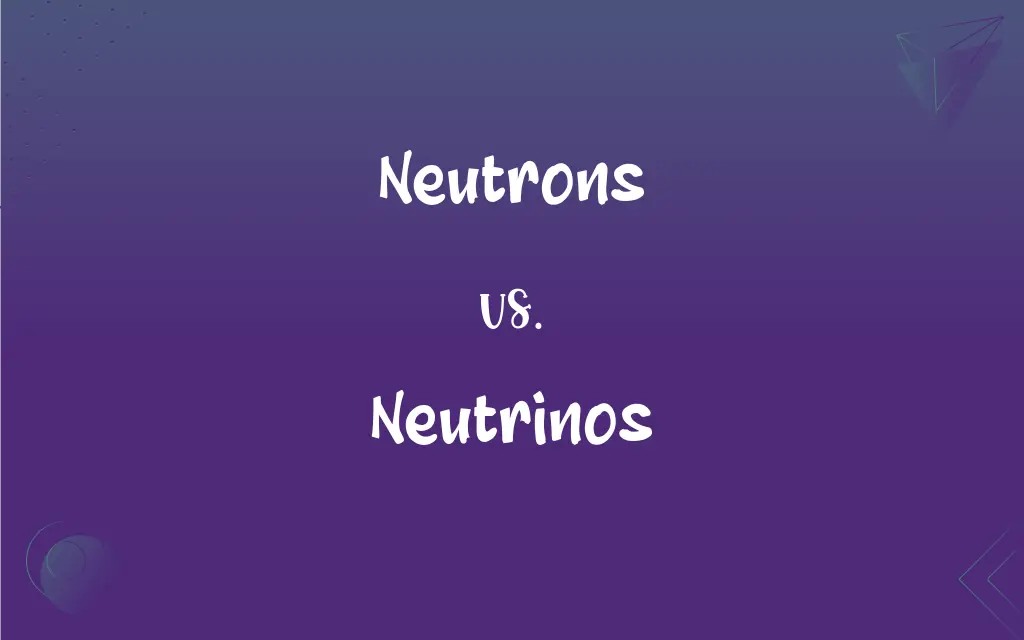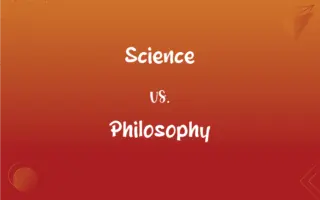Neutrons vs. Neutrinos: What's the Difference?
Edited by Aimie Carlson || By Janet White || Published on December 30, 2023
Neutrons are neutral subatomic particles in an atom's nucleus, while neutrinos are nearly massless, chargeless particles that rarely interact with matter.

Key Differences
Neutrons are neutral particles found in the nucleus of an atom, contributing to its mass but not its charge. Neutrinos are fundamental particles that are incredibly light and do not carry an electric charge.
Neutrons play a critical role in the stability of atoms, except in most hydrogen atoms. Neutrinos, in contrast, are known for their weak interaction with matter, passing through most material without any effect.
In nuclear reactions, neutrons can be released or absorbed, influencing the reaction's process. Neutrinos are often produced in nuclear reactions, such as those in the sun, but their interaction is so weak that they are hard to detect.
The existence of neutrons is vital in elements heavier than hydrogen, as they contribute to the balance of forces within the nucleus. Neutrinos, while abundant in the universe, are elusive due to their minimal interaction with other particles.
Neutrons have a mass close to that of a proton, making them relatively heavy compared to other subatomic particles. Neutrinos are among the lightest particles known, with a mass nearly a million times smaller than that of an electron.
ADVERTISEMENT
Comparison Chart
Location
Found in the atomic nucleus.
Rarely interact with matter, pass through most materials.
Charge
Neutral (no charge).
Neutral (no charge).
Mass
Similar mass to protons, significant in atomic weight.
Almost no mass, much lighter than other particles.
Role in Nuclear Reactions
Critical in nuclear reactions and stability of atoms.
Produced in nuclear reactions, but rarely interact.
Detection
Relatively easy to detect due to their mass and behavior.
Extremely difficult to detect due to weak interaction.
ADVERTISEMENT
Neutrons and Neutrinos Definitions
Neutrons
Subatomic particles with no electric charge.
Neutrons, along with protons, make up the nucleus of an atom.
Neutrinos
Byproducts of nuclear reactions, like those in the sun.
Neutrinos are abundantly produced in the nuclear fusion reactions of the sun.
Neutrons
Key players in nuclear reactions and atomic stability.
The number of neutrons determines the isotope of an element.
Neutrinos
Particles that rarely interact with matter.
Millions of neutrinos pass through our bodies every second unnoticed.
Neutrons
Essential components of all atomic nuclei except ordinary hydrogen.
Neutrons help to balance the forces within an atomic nucleus.
Neutrinos
Elusive particles difficult to detect.
Detecting neutrinos requires very sensitive and specialized equipment.
Neutrons
Neutral particles in an atom's nucleus.
The neutron is crucial for the stability of most atomic nuclei.
Neutrinos
Nearly massless subatomic particles.
Neutrinos are so light that they were long thought to be massless.
Neutrons
Particles whose presence influences atomic mass.
Atoms of the same element can have different numbers of neutrons.
Neutrinos
Chargeless particles, part of the lepton family.
Neutrinos, like electrons, belong to the lepton family but lack an electric charge.
Neutrons
The electrically neutral nucleon, a baryon composed of two down quarks and one up quark, which has a mass 1,839 times that of an electron, is stable when bound in an atomic nucleus, but has a mean lifetime of 886 seconds as a free particle. It is a basic component of all atomic nuclei except the protium isotope of hydrogen.
Neutrinos
Any of three electrically neutral leptons (the electron neutrino, muon neutrino, and tau neutrino—one in each of the three generations of elementary fermions) that have very small masses.
Neutrons
Plural of neutron
Neutrinos
Plural of neutrino
FAQs
What is a neutrino?
A neutrino is a nearly massless subatomic particle that rarely interacts with matter.
What is a neutron?
A neutron is a subatomic particle found in the nucleus of an atom, with no electric charge.
Where are neutrons located?
Neutrons are located in the nucleus of an atom.
What is the mass of a neutron?
The mass of a neutron is slightly more than that of a proton.
Are neutrinos heavier than electrons?
No, neutrinos are much lighter than electrons.
How are neutrinos detected?
Neutrinos are detected using specialized, highly sensitive equipment.
Can neutrons be found outside the nucleus?
Yes, free neutrons exist but are unstable outside an atomic nucleus.
How do neutrinos interact with matter?
Neutrinos interact very weakly with matter, making them hard to detect.
What are neutrinos made of?
Neutrinos are elementary particles and are not made of smaller particles.
What role do neutrons play in the atom?
Neutrons contribute to the mass of an atom and play a key role in its stability.
What sources produce neutrinos?
Neutrinos are produced in nuclear reactions, such as in the sun and nuclear reactors.
How do neutrons contribute to atomic weight?
Neutrons add to the atomic mass since they have a similar mass to protons.
Why are neutrinos difficult to study?
Their weak interaction with matter makes neutrinos difficult to study.
Are neutrons charged particles?
No, neutrons are neutral and have no charge.
Do neutrons participate in chemical reactions?
Neutrons do not directly participate in chemical reactions.
Can neutrons decay?
Yes, free neutrons can decay into a proton, an electron, and an antineutrino.
Are neutrinos affected by magnetic fields?
No, neutrinos are not affected by magnetic fields due to their neutral charge.
How many neutrons are in hydrogen?
Ordinary hydrogen has no neutrons in its nucleus.
What's the significance of neutrinos in physics?
Neutrinos provide insights into fundamental physics and processes like nuclear fusion.
Can neutrinos change type?
Yes, neutrinos can oscillate between different types or flavors as they travel.
About Author
Written by
Janet WhiteJanet White has been an esteemed writer and blogger for Difference Wiki. Holding a Master's degree in Science and Medical Journalism from the prestigious Boston University, she has consistently demonstrated her expertise and passion for her field. When she's not immersed in her work, Janet relishes her time exercising, delving into a good book, and cherishing moments with friends and family.
Edited by
Aimie CarlsonAimie Carlson, holding a master's degree in English literature, is a fervent English language enthusiast. She lends her writing talents to Difference Wiki, a prominent website that specializes in comparisons, offering readers insightful analyses that both captivate and inform.






































































